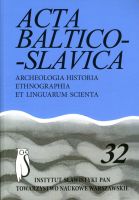Этимологические заметки по древнерусской ойконимии. Часть I. – Названия с гидронимическими основами
Etymological remarks on the Old-Russian toponymy. Part I – Names with hydronymic stems
Author(s): Maksim A. JujukinSubject(s): Language and Literature Studies
Published by: Instytut Slawistyki Polskiej Akademii Nauk
Keywords: old Russian language; chronicles; etymology; place name; hydronym
Summary/Abstract: The first part of the article presents an analysis of the origin of some place names mentioned in Old Russian chronicles and derived both from hydronyms of the Slavic descent: В(ъ)брынь (V(ъ)bryn’) < Proto Slavonic [*brьn /*brьn /]*bryn ‘swampy waters’ (the initial Въ is of the agglutinative descent); Колбал(ь)ской погост (Kolbal(’)skoy pogost) < Колба (< Slav. *kъlb ‘locus fluminis profundior’) with the linking morpheme л ; Мышега (Myshega) < IE *meu /*mou /*mū /*meә – ‘damp, humid’ (cf. Common Slavonic *myti ‘wash’, *mъxъ ‘moss’, Russian (про)мозглый ‘wet (about the weather, etc.)’, dial. мзга ‘rot, mould, damp weather’, музга ‘pool, a small drying up lake, pond, etc.’) with the extender * s + the suffix * egа; Рух (Ruh) < the IE base *reu s /*rou s from the root *reu /*rou /*rū ‘dig (up)’, richly represented both in the appelative (cf. Russian рух ‘bustle, agitation, anxiety’ (in other East and West Slavonic languages ‘movement’), рухнуть ‘collapse, fall’, рушить ‘destroy’ (in Old Russian ‘dig’ as well), рыхлый ‘friable’, Czech ruchat ‘plough’, etc.) and toponymical (Russian Рухань (Ruhan’), Old Ukrainian Рухавцы (Ruhavcy), Czech Rouchovanka) vocabulary; Сежа (Sezha) < cf. Czech dial. seží ‘it is drizzling’; Shatsk < the river name Shata < Proto Slavonic *šętati (sę) ‘loaf’, ‘totter’, ‘walk’, etc., and others.
Journal: Acta Baltico Slavica
- Issue Year: 2008
- Issue No: 32
- Page Range: 31-42
- Page Count: 12
- Language: Russian

